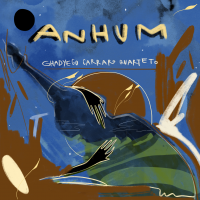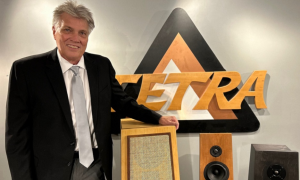Home » Jazz Articles » Chats with Cats » The Jazz Critic: Neil Tesser
The Jazz Critic: Neil Tesser

I see my job as more of an interpreter between the musicians and the non-musicians. So, if I can explain what’s going on in a way that allows people to draw their own conclusions then that’s... a better way to review things
—Neil Tesser
For this Chats with Cats I wanted to speak with a jazz critic to find out about their method and how they see their role in the creative process. I wanted to shine a light on those who are usually scrutinizing the work of others. To that end, I spoke to Neil Tesser, an award-winning journalist who has written hundreds of reviews, liner notes, and has been a jazz radio host for decades.
While most people seem to have the impression that critics like to skewer their subjects, it was obvious from our conversation that Mr. Tesser has a very high regard for jazz musicians and their plight. That shows in his reviews where he attempts, not necessarily to pass judgment, but to be a translator between the musician and the reader; to be an attentive observer that passes along his impressions to both the musician and non-musician alike. Mr. Tesser eloquently explained to me how he approaches this.
About Neil Tesser
Writer and radio host Neil Tesser has covered jazz in Chicago for more than 50 years, in media ranging from the Chicago Reader to USA Today to National Public Radio to the New York Times to Playboy Magazine. He authored The Playboy Guide to Jazz (1998); edited Learning to Listen (Berklee Press Publications, 2013)—the autobiography of famed vibraphonist Gary Burton (2013)—and has written liner notes for more than 550 albums, earning both a Grammy award and the ASCAP Deems Taylor Award for this work. A board member of the Jazz Institute of Chicago, he helped program the Chicago Jazz Festival's first four decades. In 2015 he received the Jazz Journalists Association's Lifetime Achievement Award, and in 2018, the same organization's award for Career Excellence in Broadcasting.He now writes for Jazziz and hosts a weekly program for station KSDS in San Diego, with an emphasis on Chicago jazz.
All About Jazz: Obviously, you have a deep understanding and knowledge of jazz. Were you, or are you, a musician yourself?
Neil Tesser: Yes I was. I was never a jazz musician but I played in the high school band and fooled around a little bit trying to improvise. I know music but I wouldn't consider myself a musician.
AAJ: How did you get so knowledgeable about music?
NT: Well, I did play and had some music lessons. When I got to college I wanted to know more about music. I was like the only person at the Medill School of Journalism taking music theory classes, at least when I was there. I took a couple years of music theory and got to know some stuff. Then, it was just a matter of listening, reading about things, and I'm always willing to ask actual musicians, "What just happened here?" Or, "I think I hear this as an altered blues." I often can tell on my own but I'm not afraid to call someone up and say, "I'm not sure about this and you do this for a living so please tell me because I don't want to get it wrong in print." Unfortunately, a lot of writers are willing to [laughs].
AAJ: So you did study theory as well as play an instrument.
NT: Yea. I took two years of music theory which included some composition and all of the rudimentary stuff. In my music theory class I got to meet Chico Freeman, Adegoke Steve Colson who's a pianist out in New Jersey now, and a couple other people who became players in town. That was great.
In my senior year, as I had gotten more and more into jazz, I organized the first jazz history class at Northwestern University which has a conservatory level music school but had no jazz program to speak of. It was a student-organized thing and we used a few texts that I had read. We got, as our faculty sponsor, a guy who used to be, as he always said, "a jazza," but became a fairly well known classical composer. He still had a fondness for jazz so he sponsored it but I did all of the work. So, that was my connection to the music school in addition to taking music theory and history classes.
AAJ: What are the first things you listen for when you're reviewing an album?
NT: First, I just put it on while I'm doing other stuff just to get it under my ears and see what jumps out at me. That's kind of a first pass. I'm listening for obvious stuff. If it's a singer who can't hit the right pitches, I don't want to hear too much of that. If it's a pianist whose time is suspect because it just doesn't sync up with the rest of the rhythm section, I'm not gonna want to hear too much more of that either.
But, it's not like I go looking for that stuff. That will just jump out. Otherwise, I just want to get a feel for the project. Is it just a collection of tunes? Does it have a flow from beginning to end? Is it essentially a suite? Is it Kind of Blue where everything fits together like pieces of a puzzle?
Then, I'll start listening more carefully and take notes as I listen. In my own notes I'll describe what's going on programmatically although I hate reviews like that. Like, "This tune sounds like a flower opening up into a rainbow." It's useless. It's useless to the reader and certainly useless to any musician who might want to read a review and say, "What can I learn about my own music from this?"
I'm not trying to be presumptuous but sometimes a knowledgeable listener can write about an album in a way that the person who made it goes, "Oh. Ok. That's what I was trying to do." Or, "Oh. That's an interesting way to put it." But, these artsy-fartsy descriptions are useless. I might put some of that down in my notes to help me reidentify the tune but that's just my process.
Then, somewhere along the lines, because the reviews I write are limited to three or four hundred words, I want to get to the essence of the thing and be able to spin from that. In a short review, you can't say everything but you can identify one or two core points about what's going on and then give a few examples to show why you think this is happening. So, that's kind of how I do it.
AAJ: What do you think are the key elements that make up a masterpiece?
NT: Well, again, listening through that first time you want to have a sense of completion. I would want to have a sense that this was meant to be heard as one album. An individual track can be a masterpiece performance but there's two kinds of masterpieces too. There's just a masterpiece and then there's a masterpiece just within this artist's work. Occasionally I'll hear an album, especially by a veteran player, that sums up a lot of what he's been doing and just gets down to the essence of it. I'd say that this is Clifford Jordan's masterpiece or Stanley Cowell's masterpiece. But, I think you're talking about the larger picture.
I think it has a lot to do with how it grabs you at first and how it grabs you on the fifth listening and what kind of transit you've made between those two. If you're still hearing new things, that's a good sign. If you are still reacting enthusiastically to the same things, that's a good sign.
At that point you have to give it time. I mean people are always reviewing something as a masterpiece and then a year and a half later you might look at it and go, "Eh, not so much."
AAJ: That word is probably thrown around quite a bit, huh?
NT: In reviewing, there are a lot of words thrown around quite a bit. You know, "It's brilliant. It's stunning." We're limited by the adjectives that exist or you can go find new ones that nobody understands and that's usually just trying to be a smart-ass [laughs]. You can describe things without being over adjectival.
You know, a lot of my reviews don't get quoted because I'm not saying, "This is a brilliant example of what makes jazz great" or something. I'd rather get to the specifics of what makes it great and let people draw their own conclusions. You can write a review that people read and come away saying, "Wow. This sounds pretty great and pretty brilliant" without the reviewer saying "This is pretty great and pretty brilliant." That's what I try to do.
AAJ: Since you probably know many of the artists you review, is it difficult to set aside your personal feelings for that person when doing a review of their work?
NT: Yeah. I write them on assignment and if the assignment is to review this guy that I know and I don't think it's great it'll be more of a lukewarm review. I'm not really into savaging someone in a review whether I know them or not. I think the whole review culture has been shaped by the movie reviewers, thumbs up, or thumbs down.
With a movie, you're dealing with something that hundreds of people got paid a lot of money to do. With a jazz record you're dealing with something where four or five people probably didn't get paid too much money. It shouldn't be a blood sport. I might need to say something doesn't exactly work but I try to put a positive spin on it saying something like, "This might make it work better." Or, "It just didn't happen, maybe the next one." Or, "It didn't work as well as the last one."
When it comes to people I know, if possible, I try to avoid it both positively and negatively. I'm not anxious to write a record review of just the people I know. If it's very positive you could say, "Well, it's his friend." If it's very negative you could say, "Well, that musician used to be his friend" [laughs].
I see my job as more of an interpreter between the musicians and the non-musicians. So, if I can explain what's going on in a way that allows people to draw their own conclusions then that's great. That is, for me I think, a better way to review things. The whole star system or, "How can I say something that is so extreme about this?" that doesn't really help anybody. I know it doesn't help the musicians.
Gary Burton told me many years ago that he'd rather read a negative review by someone very knowledgeable than a really positive review by someone who didn't know anything because he knew the music was being taken seriously by someone who was serious. He'd rather read that to see what they had to say.
AAJ: Since you must listen to so much music for "work" do you listen for enjoyment anymore?
NT: In person, when I go out to hear things. I have to confess that I think a lot of people who are reviewers and are in the same boat don't often sit down in front of a pair of speakers just to listen. I have stuff on shuffle. I'm kind of leafing through other things. I'm just monitoring as much of the music coming in as I can to get a sense of what it is and then I might go back and listen more carefully to a few tracks or a whole album.
Especially with going back to older things. I always love when someone writes, "Oh, I just went back to this album from fifteen years ago." I'm like, "What a luxury. I'm just trying to get to albums from fifteen months ago." There's a lot of stuff coming out.
If you're trying to keep up on everything it's difficult. But, I'm happy to know about what's going on, especially if I'm doing a radio program as I am. Again, part of it is listening with a half an ear as to what might work within the context of a program or what might make an interesting bridge from one thing to another. I like to try and get people to hear new things without them knowing it by tying them to things that they already know.
AAJ: What are some of your personal favorites within jazz and outside of jazz?
NT: Oh God. It's such a long list. Throughout history or just today?
AAJ: If you had to pick a desert island list.
NT: Well, desert island is Sonny Rollins. And, if it's Sonny Rollins with Thelonious Monk, even better. Stuff like that, all of the greats.
But, stuff of recent vintage? I like Art Ensemble Of Chicago guys from here in town. The pianist Stanley Cowell who I mentioned earlier had been an underappreciated pianist throughout his lifetime. He died last year. I'm a huge fan of saxophonist Chris Potter. Ummm... If you picked any instrument I could probably find ten.
Let's put it this way, it's people who, when I see a new album from them, it's something I want to hear right away. That would include Miguel Zenon. That would include Orrin Evans. That would include Kirk Knuffke, Mary Halvorson, Tomeka Reid, Nicole Mitchell, Ken Vandermark, Sylvie Courvoisier, Marquis Hill, Jon Irabagon, Pierre Dorge, Jean-Michel Pilc, Matt Wilson, and about seventy-five others. These are people that I'm consistently challenged and satisfied by.
Kurt Elling, who is a good friend of mine, is an exception to the rule since I rarely find anything he does objectionable. I can review things by him and not feel that anybody has to question whether I'm reviewing it well because I'm his friend. They're all really good.
These are people who, when I see that something is happening, I'm excited and I want to hear what they're doing and where it's going. Let me think, there are a few other singers...
AAJ: I'm a guitarist. How about guitar players?
NT: Guitar players. Bill Frisell is always intriguing to me. It's not always my cup of tea as he moved into other areas, which I don't mind but it just doesn't grab me the same way as, say, Peter Bernstein who plays in a more straight-ahead fashion.
I really like Jeff Parker's stuff, at least some of it, because he's so insanely versatile that you could find all kinds of corners of stuff that you'd really like from him.
Who do you like these days on guitar?
AAJ: Ummm... my favorites have been Pat Metheny, Mike Stern, John Scofield...
NT: Ok, well, Scofield is my guy. Pat Metheny, before people who are more mainstream oriented were saying it, I would argue that he is one of the great soloists in history and if you can't hear it you're just not listening. This was back when he was doing a lot more electric stuff and the real dyed-in-the-wool jazz fans were like, "Oh, Pat Metheny is real pop." I said, you need to listen to the logic of any one of his solos and then tell me what you just said. Pat is definitely one of those that, when he has a new album, I really want to hear where it's going.
AAJ: You've written hundreds of liner notes and have even won a Grammy for it. What is your approach to conceiving those?
NT: They come in different categories. One is the historical stuff like the John Coltrane thing I did that won a Grammy. I think a lot of that had to do with it being John Coltrane. It's interesting, if you look at the liner note writers who have won Grammys for jazz in recent years they are all for pretty much John Coltrane and Miles Davis [laughs]. I'm being self deferential. A lot of people told me they really liked the notes but I can't really kid myself too much. I think a lot of it had to do with the subject.
So, there are the historical things and I've done a bunch of those for the Kraft recordings when they reissued records with outtakes on vinyl. I did Way Out West and got to interview Sonny Rollins. I was proud of the way that turned out. There was a big Bill Evans set that Craft reissued several years ago and I was happy with that. So, those are the big historical notes.
Then, I do all the liner notes pretty much for Steeplechase Records. Whatever he records he sends me and it's very rare that I say that I can't get into the music because they're all pretty good. Those are more like, "Ok, let me get into this even if it's somebody I'm not that familiar with because I've been asked to do this and I want to do a good job." I want to try and analyze the music and bring people along. Again, it's not a matter of saying, "Wow. This guy is smoking on this track" [laughs]. That doesn't help the reader.
Primarily, I think, for anything that's not historical is the idea that if someone is making a record and they've gotten to that point, and they've studied harder to be a jazz musician than anything else, they should have their story told well. If it's an album that I'm just not crazy about but I've agreed to do it because someone has asked me to do it then I'll concentrate more on their biography for a new artist. I think it's important to be able to look at an album and read about the artist, find out where they were born, who they studied with, and how they got there.
Then, in other cases, it's just a matter of really trying to explain the music well or get to the essence of it so that someone listening to it can read the notes and say, "Oh. Ok. I hadn't thought about that. This helps deepen appreciation for this music."
I don't lie. If something isn't great I'm not going to say, "This is great." I will find the most positive aspect of it because liner notes are not reviews but I think they can be done with integrity even when it's not a masterpiece. I think you can find the things that are good about the music, point those out, get into what makes that musician tick, and provide an appropriate and useful accompaniment to the project.
Once in a while I'll just hear something and say, "I don't have anything to say about this." Or, "I just can't add about this." Or, "I don't feel the music so you'll need to find somebody else to do this." But, those are kind of rare because there's lots of stuff in the middle, but there's very little stuff in jazz that comes out that's just awful. You just have to work too hard to get to a level that you can improvise sincerely and believably for it just to be a dog of an album.
AAJ: You've been involved in the business for decades. What are your thoughts about the current state of the business and the music itself now, as opposed to when you started?
NT: As everybody will tell you, the music business is 10% music and 90% business. Although, at this point, there's hardly any music business at least when it comes to records. The music business is... there's all kinds of shady nonsense that goes on. But, the lack of dominance of the big labels has probably helped a lot. It's probably helped the musicians in the music business because they're not beholden to these guys to put the records out. They're not getting screwed around with royalties or payments or any of that nonsense. So, that's probably good.
The fact that there are no real gatekeeper labels anymore... People say that if John Coltrane recorded Ascension today, no label would touch it and that's probably true. So, that kind of gatekeeping kept some music away from listeners but it also raised the standard for a lot of what's released. So, now, because anyone can put out anything you hear a lot of good music but you also hear a lot that's just mediocre. Again, even mediocre jazz recordings, for me, have some value because the level of talent required to even get to jazz mediocrity dwarfs what is required in a lot of other idioms. You want to hear somebody searching sometimes and getting to the thing they're going to get to in two albums.
The general state of the music business in jazz seems to be pretty healthy. There are just a ton of people putting stuff out. There are artists all over the world with many albums out that I don't know of. I got a note from some flutist in France that said, "Would you like to listen to this?" And some of it is pretty interesting. I wouldn't have known about this guy otherwise. He's out there and has fifteen albums out.
So, in that sense, I think it's really healthy that so many people are working, so many people are inspired, and are energized, and are putting out their own things. And, I think the audiences are increasing. I don't have a statistic on it but look at some of the signs. Festivals seem to be coming up and the ones that have been going keep going strong. Samara Joy wins the Best New Artist at the Grammys and shows up on various TV shows. I know she's only one person but, sometimes, that's all it takes to break through to people who say, "Oh. I like that." And, clubs in town here seem to be more crowded than they have been, especially now that the pandemic is over. People want to go out and hear things. So, the long established clubs here in Chicago seem to be doing pretty well.
When I say the music scene is healthy it doesn't mean that everyone is doing well financially. But, from a creative standpoint, I think it's pretty strong. And, at least here in Chicago, a lot of people are able to make a living, if not as just jazz musicians, then as jazz musicians who teach, or who play on other kinds of projects. They're not busking on the street to pay the rent. So, I think that's pretty good.
Tags
Chats with Cats
B.D. Lenz
United States
Illinois
Chicago
Gary Burton
Chico Freeman
Adegoke Steve COLSON
Clifford Jordan
Stanley Cowell
Sonny Rollins
Thelonious Monk
Chris Potter
Miguel Zenon
Orrin Evans
Kirk Knuffke
Mary Halvorson
tomeka reid
Nicole Mitchell
Ken Vandermar
Sylvie Courvoisier
Marquis Hill
Jon Irabagon
Pierre Dorge
Jean-Michel Pilc
Matt Wilson
Bill Frisell
Jeff Parker
pat metheny
Mike Stern
John Scofield
John Coltrane
Miles Davis
Steeplechase Records
Samara Joy
PREVIOUS / NEXT
Support All About Jazz
 All About Jazz has been a pillar of jazz since 1995, championing it as an art form and, more importantly, supporting the musicians who make it. Our enduring commitment has made "AAJ" one of the most culturally important websites of its kind, read by hundreds of thousands of fans, musicians and industry figures every month.
All About Jazz has been a pillar of jazz since 1995, championing it as an art form and, more importantly, supporting the musicians who make it. Our enduring commitment has made "AAJ" one of the most culturally important websites of its kind, read by hundreds of thousands of fans, musicians and industry figures every month.



























